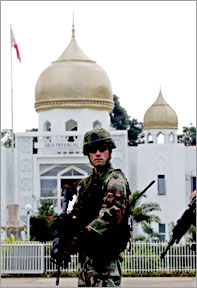US helps fight against Abu Sayyaf
Except for Humvees on the beach and armed guards, the US Navy Seals
base in Jolo island in the southern Philippines looks more like a
hang-out for surf bums than a military base for an elite anti-terrorist
task force.
|

A U.S. trooper stands guard outside the provincial capitol of the
island province of Jolo in southern Philippines, a known stronghold
of of al-Qaida-linked Abu Sayyaf group and Jemmah Islamiyah, during
the visit of U.S. Ambassador to the Philippines Kristie Kenney
(unseen) to oversee various projects. -AP |
A few yards from the detachment's temporary home in a mansion
surrounded by blast barriers and coconut palms, the surf pounds on a
powder-sand shore with jungle-covered mountains behind.
Just a few miles away are the dwindling but still dangerous remnants
of one of Asia's most ruthless Muslim militant groups, Abu Sayyaf.
With leaders trained in Afghanistan and pledged to ignite jihad in
South East Asia, the group has been blamed by the Manila government for
killing hundreds of Philippines citizens in bomb attacks and other
violence.
In 2001 the group kidnapped three Americans, beheading one. A US
missionary died in a botched rescue attempt the next year. In 2004 the
group was blamed for a ferry bombing in which 100 passengers died. The
Philippines military says international terrorists are still hiding with
Abu Sayyaf, including two men suspected of involvement in the 2002 Bali
bombings.
At that time, Abu Sayyaf were making millions of dollars from
kidnapping and virtually ran the Sulu archipelago, which for decades has
been a lawless, impoverished region notorious for pirates and Muslim
rebels. Now the revitalised Philippines security forces estimate there
are only about 200 Abu Sayyaf fighters left in the jungles of Jolo.
Hearts and minds
The US Special Forces teams, Seals and soldiers who have been based
on Jolo since 2002 are strictly forbidden from engaging in combat with
Abu Sayyaf, under terms agreed with the Philippines government. Around
100 US troops are instead equipped with the latest unmanned spy planes
and electronic eavesdropping equipment to gather intelligence on their
allies' targets.
Meanwhile, since 1997, USAid has spent $4m a year building schools,
clinics and roads to win hearts and minds on the island, one of the
poorest places in the Philippines. The posting is an unusual one for
military veterans of Iraq and Afghanistan.
"It is a bit like being in paradise, and you don't have to worry
about roadside bombs here," he said. With combat strictly banned, much
of the Americans' time is spent on hearts and minds programmes. Troops
set up clinics where villagers who rarely see the inside of a hospital
are treated.
At one clinic, Special Forces Captain Ryan Mienecke said that he had
not been near any fighting during five months on the island but had seen
plenty of Abu Sayyaf militants. Gesturing at the villagers who had
arrived to see an army doctor he said: "Take a look around you.
I'm sure some of them are here at this camp."
Human rights concerns
The US troops are full of praise for their Philippine allies, who
have fought Muslim rebels for years in Jolo and surrounding islands, but
only managed to win over much local support in recent years, partly
thanks to US money. Special Forces Captain Ian Berg said: "The islanders
don't really support Abu Sayyaf they just want stability, and that's
what's being established here." The US Government has also spent
millions of dollars on rewards for information leading to the arrest or
killing of named militants.
The two most wanted are accused Bali bombers Umar Patak and Dulmatin,
who has a $5m price on his head. A major success came at the end of 2006
when Abu Sayyaf's leader Khadaffy Janjalani was killed in a fire fight.
Islanders are wary about the military but most agree that crime rates
are down and an edgy normality has returned after years of chaos and
bloodshed.
Some human rights campaigners are critical of the Philippines
military, however, claiming that civilians are killed in the fighting as
well as militants. Merlie Mendoza, of human rights group Tabang
Mindanao, said: "Villagers see armed men, whether guerrillas or the
military, they run away into the trees, and in the confusion they are
shot. There are not investigations into what happens and nobody knows
how often it happens."
General Juancho Sabban, the ebullient public face of the fight
against Abu Sayyaf, is confident that the tactics are working and that
Abu Sayyaf will eventually be wiped out. "If you win the people, you win
the war," he said.
BBC
|
